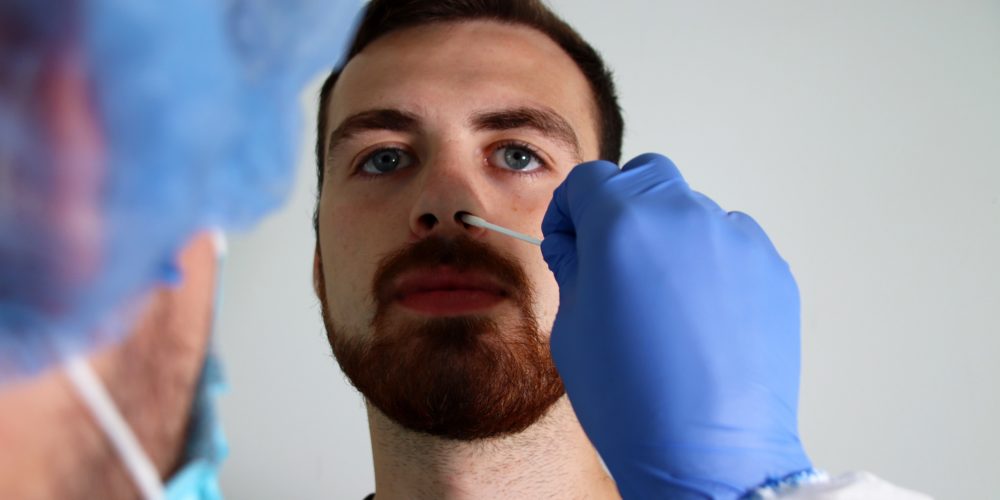
Can A Person Test Negative and Later Test Positive for COVID-19?
Testing negative for COVID-19 doesn’t always mean you’re in the clear to return to normal. In some cases, a negative result does not rule out the presence of SARS-CoV-2 infection. There is a possibility that your COVID-19 test showed a negative result by mistake.
There are two common types of tests used to determine if someone is positive or negative with COVID-19: PCR and rapid antigen. A polymerase chain reaction (PCR) test looks for the “DNA” of SARS-CoV-2 on a molecular level to determine if a person is infected. An antigen test looks for proteins on the outside of the SARS-CoV-2 virus to determine if there is an active infection in a person. Believe it or not, the type of test you get does make a difference. Lab PCR tests are more accurate and reliable than antigen tests, which make up a large portion of at-home testing. If you have uncertainty about your results, you may want to follow up with a PCR test.
Should you need trustworthy results quickly, BioCollections specializes in PCR COVID-19 testing to ensure you get an answer on whether you’re positive or negative.
Can You Get a False Negative COVID-19 Diagnostic Test?
Yes, you can receive a false negative COVID-19 test. A false negative occurs when you receive a negative COVID-19 test result even though you are positive for the virus. According to the CDC, testing fewer than five days after exposure to COVID-19 might yield a negative result. In fact, a Johns Hopkins study reports that from day four after exposure you’re up to 67 percent more likely to receive a negative test result. After the five-day period (or after the onset of symptoms), the COVID-19 false negativity rate drops significantly. The UK Government concluded PCR tests have 95 percent sensitivity and the PCR false negative rate should not be higher than five percent. A Cochrane review of data states that the PCR test is 98 percent accurate. However, the rapid antigen test’s sensitivity is much lower and less accurate, which can result in more false negatives.
What does this mean? If you receive a negative COVID-19 test with symptoms, it is possible you received a false negative depending on the timing of when you took the test after your exposure. This is why it’s always important to consult a healthcare provider when considering test results.
What Are the Risks of False Negative COVID-19 Results?
The thought of getting a false negative result can be scary. It’s important to keep in mind that there are a number of risks associated with false negative COVID-19 tests. The main risk is making sure you are safely quarantined and supervised for any adverse health issues. The FDA notes that a false negative result can lead to not getting treatment on time, difficulty making sure you and those in your household are monitored for community spread, and other health concerns related to a COVID-19 infection.
What Should I Do If I Still Have Symptoms After a Negative COVID-19 Test Result?
If you took an at-home test, The Mayo Clinic suggests that you follow up with a lab-based PCR test. PCR tests are the “gold standard” for COVID-19 testing and are often used to confirm a rapid antigen test result. If these tests are negative, it is possible you have the flu. It is important to consult with your healthcare provider to determine what steps are necessary for you.
A few things you can do while you remain symptomatic:
- Physically distance six feet from others
- Wear a mask in indoor public spaces
- Wash your hands often
- Disinfect surfaces regularly
If you’ve been exposed to COVID-19, these preventative measures keep everyone around you safe regardless if you are symptomatic.
What Could Be the Cause of a False Negative COVID-19 Antigen Test Result?
Simply put, the main cause of a false negative antigen test could be an issue with the tests themselves. According to a Cochrane Library review of more than 24,000 samples, antigen tests are only 58 percent accurate for people with no symptoms of COVID-19 or 72 percent accurate for those with symptoms. While antigen tests provide results in as little as 15 minutes, their accuracy falls short. It’s also important to note that some antigen tests expire, so if you’re testing at home, be sure to check the expiration date on the package.
BioCollections: Security in COVID-19 Testing
Waiting for your COVID-19 test results can be nerve-wracking. At BioCollections, we get you reliable COVID-19 and flu panel results in as little as 10-24 hours. We have locations in several locations worldwide and pride ourselves on over 20 years of serving our communities. Head over to our website to schedule your COVID-19 test today!
